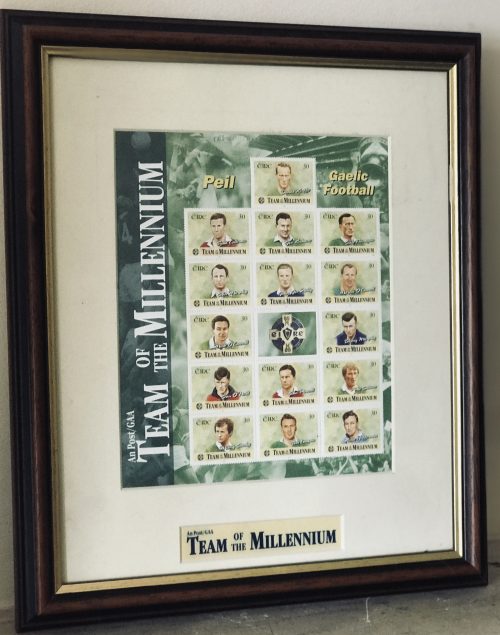I remember you hit the door a few raps. You were off the bus first. There was this lad and his job was to let no one in that door, or he’d lose his job for the next day. He was shouting: “Ye can’t come in here! The official door is there for ye.” And I said to you: “Shem, sit back down here with us. Sure, there’s no rush. They can’t start without us.” Next thing, a fella opened a door further up, and we all walked in.
To get from the Anner Hotel down to the pitch on the day was phenomenal in itself. We had a Garda escort, but even with it we could hardly get down with the crowds. It was frustrating. Here we were, in Thurles since early, and we still weren’t on time.
I never got frustrated. What was the point?
Jackie always had a more relaxed, practical view. He was years ahead of us, in every sense. He was ‘The Godfather’ and we all looked up to him.
But to give you an idea of how different things were back then… When you came in the gate, at the back of the Old Stand in Thurles, getting to the front door of the dressing room was still a nice few yards. As I walked across, I met four to six people I knew as well as I knew Jackie O’Gorman.
I saluted every one of them, and not one of them was capable of saluting me back. They were in a frenzy, a pure frenzy.
They thought Clare were going to win the Munster Championship for the first time since 1932. They were in a zone apart, going in to get their seat to see it all.
So there was a tension-filled trip on the bus, followed by more tension at the ground. There was nothing that could have been done about it. I think the officials were overwhelmed by the amount of people that simply turned up, hoping they might get in.
I didn’t get caught up in the hype at all. Goalies are different. Ye have to think about the game more. Ye can’t make a mistake. We can make a mistake, because someone will cover up for you, behind the play, what have you. But no one hurled that day in ’78, both teams. Cork didn’t hurl either. It was an absolute disaster of a day. Never got going as a contest.
I’d go back a year. I think you have to go back a year, to the 1977 Munster Final, in order to understand 1978. If we had won in ’77, I’ll always maintain strongly, we’d have won in ’78. But refereeing changed the whole structure of that first game. We were hurling well in ’77. We were beating Cork, and we had them in desperate trouble all over the place, halfway through the first half. Noel Casey at full-forward was destroying Martin O’Doherty in front of the goal. We were under no pressure at our end of the field.
Then it all changed. I was in the Town goal and Charlie McCarthy, at corner-forward, got involved with our full-back, Jim Power. I can’t say Charlie was a dirty player because he most certainly wasn’t. But that day there was a bit of skulduggery going on, and Charlie pulled three or four times against Jim Power’s leg, and nothing was done about it. Charlie should have had his name taken. Some referees might have sent him off. But it was let go by the referee on the day, Noel Dalton.
Ray Cummins was full forward for Cork, a bright intellectual guy, a wonderful thinker about the game, a brilliant hurler. Ray was one of the three best forwards we ever met in Munster, along with Éamonn Cregan and Francis Loughnane.
 Cork’s Ray Cummins (right) flicking the ball past Clare fullback Jim Power. Cummins goal in the 1977 Munster final turned the match around.
Cork’s Ray Cummins (right) flicking the ball past Clare fullback Jim Power. Cummins goal in the 1977 Munster final turned the match around.Now, Jackie was involved in a key incident, which I’ll come to. Ray went up for a ball and caught it. He was the only player I ever saw with the uncanny ability of going forward for the ball in the air, getting it in his hand, and being able to land turned for goal. Jim Power wasn’t the most agile in those situations. So Ray slipped Jim on the turn and came on for goal.
I was in the goals and there was no one between him and me. Being such a tall fella, Ray took his four or five long steps, coming in. And I said to myself: ‘Do I go too early or do I stay?’ So I waited and waited, until the last. And, just as he was on his last step, he dropped the hurley and palmed the ball.
At that stage, as far as I’m concerned, there should have been a whistle blown and a free out for dropping the hurley. We were beating Cork by five points at that stage, I think, and hurling them off the field. This is how close we came to winning a Munster Championship and an All-Ireland… Palmed the ball, and I instinctively put up my shoulder. The ball hit me there [indicates right shoulder], went up and hit the inside of the crossbar, and went into the net. That moment changed the whole course of the game.
Was that rule there at the time? I can’t remember. Weren’t you allowed to palm the ball into the net? I remember it happening in All-Ireland Finals during the Seventies, goals got by palming it in.
You could palm the ball into the net or over the bar, so long as you hadn’t dropped the hurley first. They didn’t stop scoring with the hand until sometime in the 1980s, I think. But Ray Cummins dropped his hurley before he palmed the ball that hit my shoulder.
Footage of the game bears out this point. Mick Dunne is doing the commentary for RTÉ and he expresses big surprise that the referee didn’t pull up Ray Cummins for dropping the hurl.
Right. If the rule was there, it was there. But referees will always get stuff wrong…
I’ll go back to the hurley being dropped and the other way it might have transpired. Instead of Cork getting a goal, Clare get a free on the 21-yard line, and I land it above in the far square on top of Noel Casey, who is having a right game and had already scored a goal. Maybe, off the free, Noel gets a point or a goal? Do you see what I mean? It was an awful big swing, on one incorrect decision.
Anyway, shortly after that goal, another high ball arrives. And here is where Jackie O’Gorman comes in. Ray Cummins goes up for that ball, in a no man’s land between full-forward and corner-forward. Jackie comes across, being the bit of a free spirit he always was. He’s conscious Cummins has just scored a goal off a high ball, and he pulls, to make sure Cummins doesn’t catch this time. Jackie was just doing his job, helping out his man at full-back.
I was great for that! Coming across, helping out. A regular Samaritan…
Whatever way Jackie pulled, Cummins goes down, and there was a free in. Cummins gets up off the ground and faces back towards goals. Jim Power is in his way, standing there, in case there’s a quick free. As Cummins heads towards the goals, he went to go at Power. He must have thought it was Jim who had got him, but it was Jackie. Cummins was mouthing into Power’s face, and he was right up close against him, breathing on him.
This is the white heat of battle, now. This is after Ray Cummins had scored a goal shortly beforehand, after Charlie McCarthy had failed to get booked for slapping at Jim Power. So he was rightly pissed off. Instinctively, with someone so flush in his face, Power did move [indicates a slight movement of head]. A flick, like that. Ray could have got an Oscar for going down.
Then the crowd started baying. The referee came in (and I’m the only one who heard the conversation with his umpires). He comes in to the umpire on my right and says: “What happened? Did you see anything?” He said back: “No, I didn’t see anything at all.” Then Noel Dalton asked the other umpire: “Did you see it?” That umpire said: “He butted him with his head.” Dalton said: ”What? Are you sure?” He repeated: “He butted him with his head.” The ref walked out, took Jim Power’s name, sent him straight to the line. Ray Cummins got up 30 seconds later, played on, not a bother on him. If Power had broke his nose, fair enough. Take out the red card. Ray was a gentleman off the field, and mostly on it too. But it was a disappointing thing on his part. Then again, I suppose he thought Jim had caught him under the high ball… I don’t blame Ray. The real truth was that the referee wasn’t up to the job. His head went on the day.
But when I look back on it now I have no regrets about any of it. No regrets whatsoever. I thought those years were the best years of our lives.
Absolutely. They were the same for all of us.
Ray Cummins was a really tremendous forward. And there was no ill-will in the slightest between Clare and Cork. No way at all. They were just a bit craftier than us.
They were crafty, and 1977 proved it. We had to see out the rest of the game with 14 men. The free Charlie McCarthy struck over after that sending off put Cork up two points. We had been ahead five points, going great, and now, two high balls later… One was a free out and the other shouldn’t have been a red card. Jim Power went to hell and back over 1977, inside Clare and outside Clare.
We’d have waltzed through Cork in ’78, only for ’77 hanging over us. That destroyed the whole scenario for us. Three-quarters of our team froze on the day in ’78. I mean, 13 points to 11 points as all the scoring done, in a top of the ground game that should have suited us down to the ground. Ray Cummins was one of the best Cork hurlers of all time but he hardly got a puck of the ball in ’78.
Am I right in concluding that ye played on in 1977 with five backs on six forwards? That aspect would amaze people today, playing on minus a defender…
Yes, we stayed with just the five backs. That was the way it was at the time. I stayed inside marking Ray and Charlie, with John [McMahon] on Seánie [O’Leary] in the other corner. Those days, the coaching end of it on the sideline was pretty basic. There was no such thing as take off a forward and put on a back. In our time playing, the game wasn’t analysed the same way at all. It was absolutely man on man, do your job, and get out of the way if you can’t do your job. We were never coached, as such. Justin [McCarthy] came in and did fine work on the skills end of it. But the game wasn’t looked into the same way as you have now.
Every team took that approach to a sending off at the time.
We didn’t think as much about it. That time, when you went playing hurling, it was to get away from work. Now the current lads nearly go to work to get away from hurling! The present player’s life is consumed by it now. I don’t think a full-time farmer or a tradesman could be a hurler now. Where would he find the time to do the training? Instead you can go off to work for the day. It’s grand: no gym, no weights, no nutrition checks… It’s nearly a break.
You take the hamstring issue now. The present players get so much of this hamstring trouble because they’re straining so much one minute, going at it so hard in training, and then they go and work all day at a desk [mimics typing on a keyboard]. And then the whole thing, the whole body, goes slack. And then if they don’t warm up properly (and we are often laughing at the length of the current warm-ups), they’re fecked. It’s one extreme to another.
I always equate it to a greyhound and a sheepdog. You never saw a sheepdog break its toe. Yet every day greyhounds run out, one of them breaks his toe. Because the greyhound is cooped up all day.
Don’t get me wrong. I think the game now, as a spectator sport, is wonderful to watch. I love it. I don’t agree with this short game Clare were playing, and other counties. A lad runs out 50 yards from goal and he passes the ball sideways to someone… But Clare this year are gone away from that stuff and are playing a bit more direct hurling. They usually have three forwards inside now.
The home advantage makes a big difference in this new round-robin system.
It does. Clare should have beaten Cork, down in Cork, only the full-back line went ball-watching and allowed a ball that should have been let wide be struck back across, and a goal got off it. I think our forwards are doing pretty well but our backs, as a unit, are a bit vulnerable. They were cruising against Waterford, at home in Cusack Park, but conceded five or six points at the end of it for no reason I could see. As a unit, at the back, they don’t seem to know how to close it out.
We’ve no enforcer in the current Clare team.
John Conlon is the best we have at the minute, and he’s a great old warrior. But he’s not that kind of guy, the kind of lad who’s going to shout: ‘Come on! We’ll go through them now!’ We don’t seem to have any talkers. They’re playing a lovely game…
They are, but it’s a schoolboy game. If you don’t have a couple of enforcers, particularly around the half-forward line, you’ll end up in bother. If you have overly fancy players under the dropping ball, you’re in trouble all day. Because if you have to go long, if the short game doesn’t work for you, you’re caught. If you don’t practise long, if you don’t practise hurling over your head, you’re sucked into an alien game, and you’ll be beaten when the game heats up. You can’t do what you didn’t practise. The big day, the hot day, you’ll be caught out.
He doesn’t have to be scoring loads of goals or points, your enforcer. But he has to be going looking for work, knowing he has a lad beside him to give it to, a lad who’ll slot it over the bar. The only time Tipp are a force, in my view, is when [Patrick] ‘Bonner’ Maher is centre-forward, running at defences. [John] ‘Bubbles’ [O’Dwyer] won’t run through the middle. Neither will John McGrath or Noel McGrath.
Tipp lifted off when ‘Bonner’ came on last Sunday. He scored a goal, even though he won’t always score a goal, because he’s not a good striker. But neither was John Power of Kilkenny or Brendan Lynskey of Galway.
They bring something else, something vital, those sort of hurlers.
 The 1938 All-Ireland Football Final Replay on October 23rd, 1938 ended in the most bizarre fashion imaginable when with 2 minutes left to play, Galway supporters, mistakenly believing the referee had blown for full-time, invaded the pitch, causing a 20 minute delay before the final minutes could be played out.
Even more dramatic was the fact that by the time the pitch was cleared, most of the Kerry players seemed to have disappeared.
The 1938 All-Ireland Football Final Replay on October 23rd, 1938 ended in the most bizarre fashion imaginable when with 2 minutes left to play, Galway supporters, mistakenly believing the referee had blown for full-time, invaded the pitch, causing a 20 minute delay before the final minutes could be played out.
Even more dramatic was the fact that by the time the pitch was cleared, most of the Kerry players seemed to have disappeared.
 The confusion all began with a free awarded to Kerry by referee Peter Waters of Kildare with Galway leading the defending champions, by 2-4 to 0-6.
The referee placed the ball and blew his whistle for the kick to be taken while running towards the Galway goals. He looked round just as Sean Brosnan was taking the kick and seeing a Galway player too close he blew for the kick to be retaken.
Thinking that he had blown for full-time the jubilant Galway supporters invaded the pitch.
The confusion all began with a free awarded to Kerry by referee Peter Waters of Kildare with Galway leading the defending champions, by 2-4 to 0-6.
The referee placed the ball and blew his whistle for the kick to be taken while running towards the Galway goals. He looked round just as Sean Brosnan was taking the kick and seeing a Galway player too close he blew for the kick to be retaken.
Thinking that he had blown for full-time the jubilant Galway supporters invaded the pitch.
 It took all of twenty minutes to clear the pitch but only then did the real problems come to light. Jerry O’Leary Chairman of the Kerry Selection Committee outlined their dilemma.
It took all of twenty minutes to clear the pitch but only then did the real problems come to light. Jerry O’Leary Chairman of the Kerry Selection Committee outlined their dilemma.

 Somehow or other Kerry managed to re-field even if the team which played out the remaining minutes bore little resemblance to the starting fifteen.
Somehow or other Kerry managed to re-field even if the team which played out the remaining minutes bore little resemblance to the starting fifteen.
 More remarkable again was the fact that Kerry went on to add another point to their total before the referee finally blew for full-time with Galway winners by 2-4 to 0-7.
It was generally agreed that the confusion was of the crowd’s and not the referee’s making but questions remained about the total number of players Kerry had been permitted to use in those final few minutes.
More remarkable again was the fact that Kerry went on to add another point to their total before the referee finally blew for full-time with Galway winners by 2-4 to 0-7.
It was generally agreed that the confusion was of the crowd’s and not the referee’s making but questions remained about the total number of players Kerry had been permitted to use in those final few minutes.
 The National and Provincial papers and indeed all available Records to this day list only those 16 Kerry players who were involved prior to the 20 minute interruption but now (80 years on) for the first time all the players who played for Kerry in that October 23rd, 1938 All-Ireland Final Replay can be given their rightful place in the Record Books.
KERRY’s 24:
The National and Provincial papers and indeed all available Records to this day list only those 16 Kerry players who were involved prior to the 20 minute interruption but now (80 years on) for the first time all the players who played for Kerry in that October 23rd, 1938 All-Ireland Final Replay can be given their rightful place in the Record Books.
KERRY’s 24:

 That night, in front of a 1,500 crowd, at a Gaelic League organised Siamsa Mór in the Mansion House in Dawson Street, Art McCann presented the Galway team with their winners’ medals.
That night, in front of a 1,500 crowd, at a Gaelic League organised Siamsa Mór in the Mansion House in Dawson Street, Art McCann presented the Galway team with their winners’ medals.
 The Kerry players meanwhile joined 300 of their suppoeters at a Ceilidhe hosted by the Kerrymen’s Social Club in Rathmines Town Hall.
The National Newspapers may not always have reported the facts to Galway’s satisfaction but there can be no questioning the support of Galway County Council.
The Kerry players meanwhile joined 300 of their suppoeters at a Ceilidhe hosted by the Kerrymen’s Social Club in Rathmines Town Hall.
The National Newspapers may not always have reported the facts to Galway’s satisfaction but there can be no questioning the support of Galway County Council.
 Needless to say the Galway players received an unprecedented welcome on their return to Galway having first been feted along the way in Mullingar, Streamstown, Moate and Athlone.
GALWAY – 1938 ALL-IRELAND SENIOR FOOTBALL CHAMPIONS
Needless to say the Galway players received an unprecedented welcome on their return to Galway having first been feted along the way in Mullingar, Streamstown, Moate and Athlone.
GALWAY – 1938 ALL-IRELAND SENIOR FOOTBALL CHAMPIONS
 Back (L-R) Bobby Beggs, Ralph Griffin, John Burke, Jimmy McGauran, Charlie Connolly, Brendan Nestor, Dinny Sullivan, Mick Connaire, Martin Kelly. Front (L-R) Frank Cunniffe, Jackie Flavin, Mick Higgins, John ‘Tull’ Dunne (Capt), Ned Mulholland, Mick Raftery.
Substitutes: (not in photograph) Mick Ryder and Pat McDonagh.
TIME ADDED ON:
Not far behind the controversy surrounding the last few minutes of 1938 All-Ireland Football Final Replay was the controversy surrounding the last few seconds of the drawn match played a month earlier.
Back (L-R) Bobby Beggs, Ralph Griffin, John Burke, Jimmy McGauran, Charlie Connolly, Brendan Nestor, Dinny Sullivan, Mick Connaire, Martin Kelly. Front (L-R) Frank Cunniffe, Jackie Flavin, Mick Higgins, John ‘Tull’ Dunne (Capt), Ned Mulholland, Mick Raftery.
Substitutes: (not in photograph) Mick Ryder and Pat McDonagh.
TIME ADDED ON:
Not far behind the controversy surrounding the last few minutes of 1938 All-Ireland Football Final Replay was the controversy surrounding the last few seconds of the drawn match played a month earlier.

 The sides were level, Kerry 2-06 Galway 3-03, when Kerry’s J.J. Landers sent the ball between the Galway uprights for what looked like the winning point. However the thousands of celebrating Kerry supporters making for the Croke Park exits were soon stopped in their tracks.
The sides were level, Kerry 2-06 Galway 3-03, when Kerry’s J.J. Landers sent the ball between the Galway uprights for what looked like the winning point. However the thousands of celebrating Kerry supporters making for the Croke Park exits were soon stopped in their tracks.
 It was cruel luck on Kerry and while there were many who criticised the referee, Tom Culhane from Glin, County Limerick, for blowing the final whistle while John Joe Landers was it the act of shooting, Kerry’s County Board Chairman Denis J. Bailey wasn’t among them.
At the next Central Council meeting, in a remarkably generous response to the Referee’s Report being read he stated that ‘they in Kerry were quite satisfied with the result’ and ‘They wished to pay a tribute to Galway for their sporting spirit and also to the referee who, in their opinion, carried out his duties very well.’
The Central Council then awarded the two counties £300 each towards the costs of the two-week Collective Training Camps both counties had planned in the lead up to the Replay on October 23rd. Munster Council granted Kerry (pictured here in Collective Training) an additional £100.
It was cruel luck on Kerry and while there were many who criticised the referee, Tom Culhane from Glin, County Limerick, for blowing the final whistle while John Joe Landers was it the act of shooting, Kerry’s County Board Chairman Denis J. Bailey wasn’t among them.
At the next Central Council meeting, in a remarkably generous response to the Referee’s Report being read he stated that ‘they in Kerry were quite satisfied with the result’ and ‘They wished to pay a tribute to Galway for their sporting spirit and also to the referee who, in their opinion, carried out his duties very well.’
The Central Council then awarded the two counties £300 each towards the costs of the two-week Collective Training Camps both counties had planned in the lead up to the Replay on October 23rd. Munster Council granted Kerry (pictured here in Collective Training) an additional £100.
 Prior to that Central Council meeting, General Secretary, Pádraig Ó’Caoimh, received a telephone call from the New York GAA suggesting the replay take place in New York but the request (which was successfully repeated nine years later in 1947) was on this occasion turned down.
However doubts about the Replay even going ahead were immediately raised.
Prior to that Central Council meeting, General Secretary, Pádraig Ó’Caoimh, received a telephone call from the New York GAA suggesting the replay take place in New York but the request (which was successfully repeated nine years later in 1947) was on this occasion turned down.
However doubts about the Replay even going ahead were immediately raised.
 Satisfactory transport arrangements were eventually agreed and the match went ahead although the Kerry supporters who left Tralee on the so-called ‘ghost’ train at 1am on the morning of the October 23rd may still have felt hard done by.
Satisfactory transport arrangements were eventually agreed and the match went ahead although the Kerry supporters who left Tralee on the so-called ‘ghost’ train at 1am on the morning of the October 23rd may still have felt hard done by.
 In the lead-up to the game the Galway selectors expressed their delight at the success of their forwards short hand-passing game against the Kerry backs in the drawn match although there were some worries that not all their players had been able to attend the first week of Collective Training and of course there was Kerry’s Replay record to be considered.
Kerry had previously played in 4 All-Ireland Replays and won them all, a great source of encouragement to the Kerry supporters.
However amid some reports of disharmony within the Kerry camp, following a ‘trial match’ on the Sunday before the Replay, the Kerry selection Committee dropped a real bombshell.
Joe Keohane (Dublin Geraldines) who had been Kerry’s regular full-back for the previous two years and was one of the stars of their 1937 All-Ireland win over Cavan was replaced by young Paddy ‘Bawn’ Brosnan a member of the 1938 Kerry Junior team.
A back injury to Kerry’s best forward, J.J. Landers made him an extreme doubt for the Replay with Martin Regan on stand-by to take his place if required which is exactly what happened before that fateful free-kick, that infamous 20 minute delay and Kerry’s unprecedented use of 24 players.
Most definitely an All-Ireland Final and Final Replay never to be forgotten.
In the lead-up to the game the Galway selectors expressed their delight at the success of their forwards short hand-passing game against the Kerry backs in the drawn match although there were some worries that not all their players had been able to attend the first week of Collective Training and of course there was Kerry’s Replay record to be considered.
Kerry had previously played in 4 All-Ireland Replays and won them all, a great source of encouragement to the Kerry supporters.
However amid some reports of disharmony within the Kerry camp, following a ‘trial match’ on the Sunday before the Replay, the Kerry selection Committee dropped a real bombshell.
Joe Keohane (Dublin Geraldines) who had been Kerry’s regular full-back for the previous two years and was one of the stars of their 1937 All-Ireland win over Cavan was replaced by young Paddy ‘Bawn’ Brosnan a member of the 1938 Kerry Junior team.
A back injury to Kerry’s best forward, J.J. Landers made him an extreme doubt for the Replay with Martin Regan on stand-by to take his place if required which is exactly what happened before that fateful free-kick, that infamous 20 minute delay and Kerry’s unprecedented use of 24 players.
Most definitely an All-Ireland Final and Final Replay never to be forgotten.
 The Galway and Kerry players parade in front of the newly opened (1938) Cusack Stand
The Galway and Kerry players parade in front of the newly opened (1938) Cusack Stand

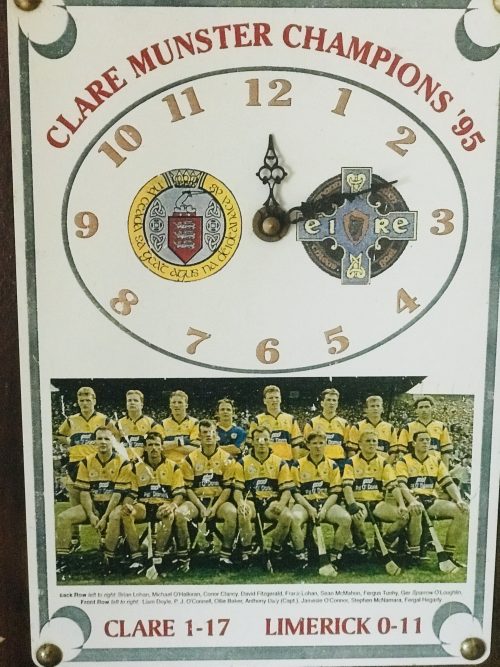
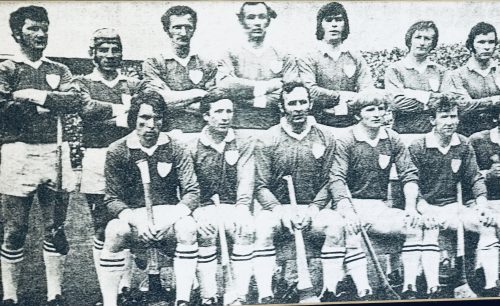

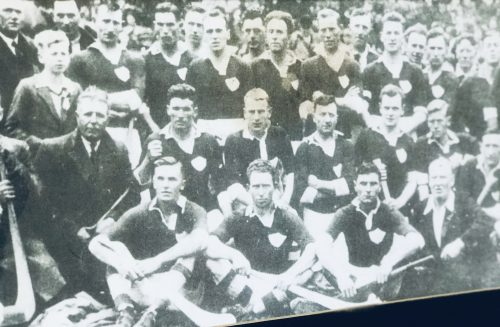
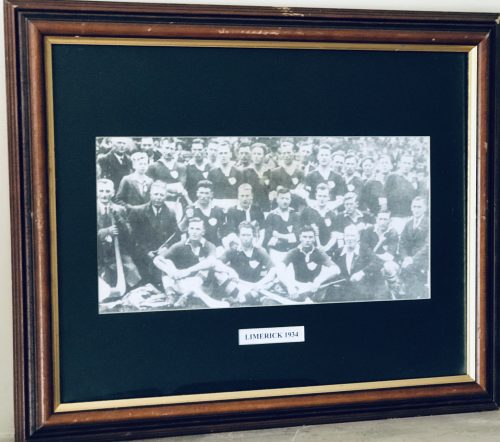
 Limerick 5-2 Dublin 2-6
D Clohessy 4-0, M Mackey 1-1, J O’Connell 0-1
Limerick 5-2 Dublin 2-6
D Clohessy 4-0, M Mackey 1-1, J O’Connell 0-1



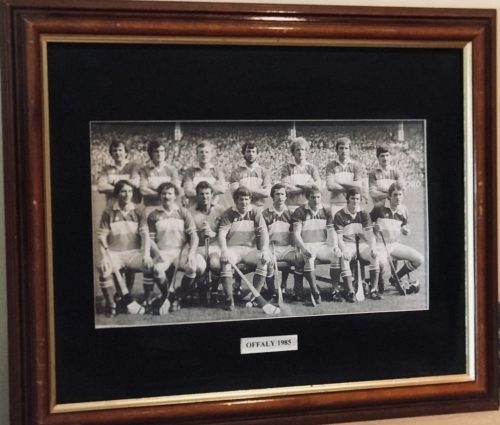
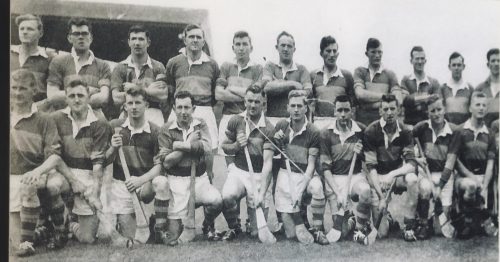
 Tom Moloughney, Jimmy Doyle, and Kieran Carey relax in the dressing room after Tipperary’s victory over Dublin in the 1961 All-Ireland final, a success that was to be repeated the following year. Picture from ‘The GAA — A People’s History’
Tom Moloughney, Jimmy Doyle, and Kieran Carey relax in the dressing room after Tipperary’s victory over Dublin in the 1961 All-Ireland final, a success that was to be repeated the following year. Picture from ‘The GAA — A People’s History’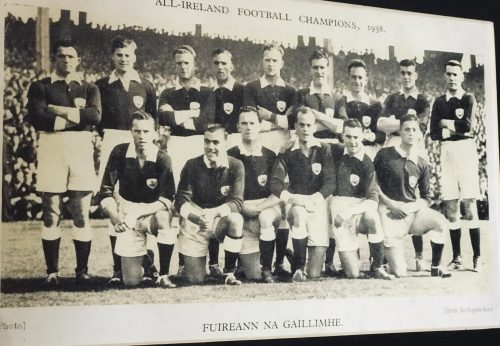

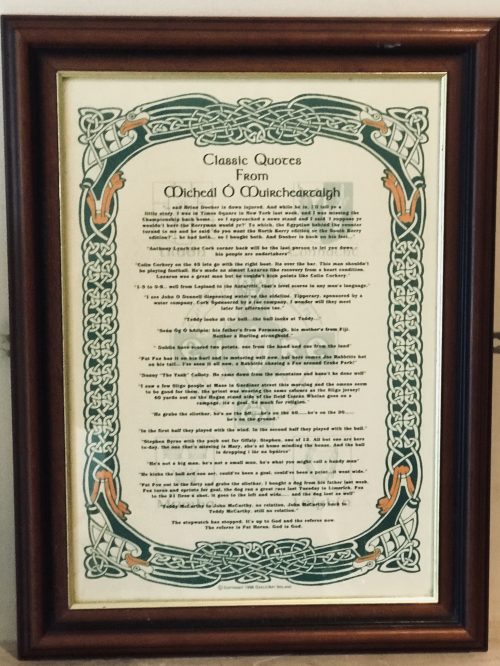


 Cork’s Ray Cummins (right) flicking the ball past Clare fullback Jim Power. Cummins goal in the 1977 Munster final turned the match around.
Cork’s Ray Cummins (right) flicking the ball past Clare fullback Jim Power. Cummins goal in the 1977 Munster final turned the match around.